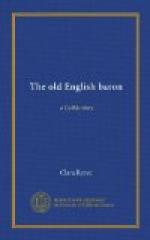“My Lord, I asked if any body would go with me, and they all declined it but he; I thought proper to have a witness beside myself, for whatever might be seen or heard.”
“Joseph, you were servant to the late Lord Lovel; what kind of man was he?”
“A very comely man, please your lordship.”
“Should you know him if you were to see him?”
“I cannot say, my lord.”
“Would you have any objection to sleep a night in that apartment?”
“I beg,—“I hope,—“I beseech your lordship not to command me to do it!”
“You are then afraid; why did you offer yourself to go thither?”
“Because I was not so much frightened as the rest.”
“I wish you would lie a night there; but I do not insist upon it.”
“My lord, I am a poor ignorant old man, not fit for such an undertaking; beside, if I should see the ghost, and if it should be the person of my master, and if it should tell me any thing, and bid me keep it secret, I should not dare to disclose it; and then, what service should I do your lordship?”
“That is true, indeed,” said the Baron.
This speech,” said Sir Robert, “is both a simple and an artful one. You see, however, that Joseph is not a man for us to depend upon; he regards the Lord Lovel, though dead, more than Lord Fitz-Owen, living; he calls him his master, and promises to keep his secrets. What say you, father, Is the ghost your master, or your friend? Are you under any obligation to keep his secrets?”
“Sir,” said Oswald, “I answer as Joseph does; I would sooner die than discover a secret revealed in that manner.”
“I thought as much,” said Sir Robert; “there is a mystery in Father Oswald’s behaviour, that I cannot comprehend.”
“Do not reflect upon the father,” said the Baron; “I have no cause to complain of him; perhaps the mystery may be too soon explained; but let us not anticipate evils. Oswald and Joseph have spoken like good men; I am satisfied with their answers; let us, who are innocent, rest in peace; and let us endeavour to restore peace in the family; and do you, father, assist us.”
“With my best services,” said Oswald. He called the servants in. “Let nothing be mentioned out of doors,” said he, “of what has lately passed within, especially in the east apartment; the young gentlemen had not so much reason to be frightened as they apprehended; a piece of furniture fell down in the rooms underneath, which made the noise that alarmed them so much; but I can certify that all things in the rooms are in quiet, and there is nothing to fear. All of you attend me in the chapel in an hour; do your duties, put your trust in God, and obey your Lord, and you will find every thing go right as it used to do.”
They dispersed; the sun rose, the day came on, and every thing went on in the usual course; but the servants were not so easily satisfied; they whispered that something was wrong, and expected the time that should set all right. The mind of the Baron was employed in meditating upon these circumstances, that seemed to him the forerunners of some great events; he sometimes thought of Edmund; he sighed for his expulsion, and lamented the uncertainty of his fate; but, to his family, he appeared easy and satisfied.




